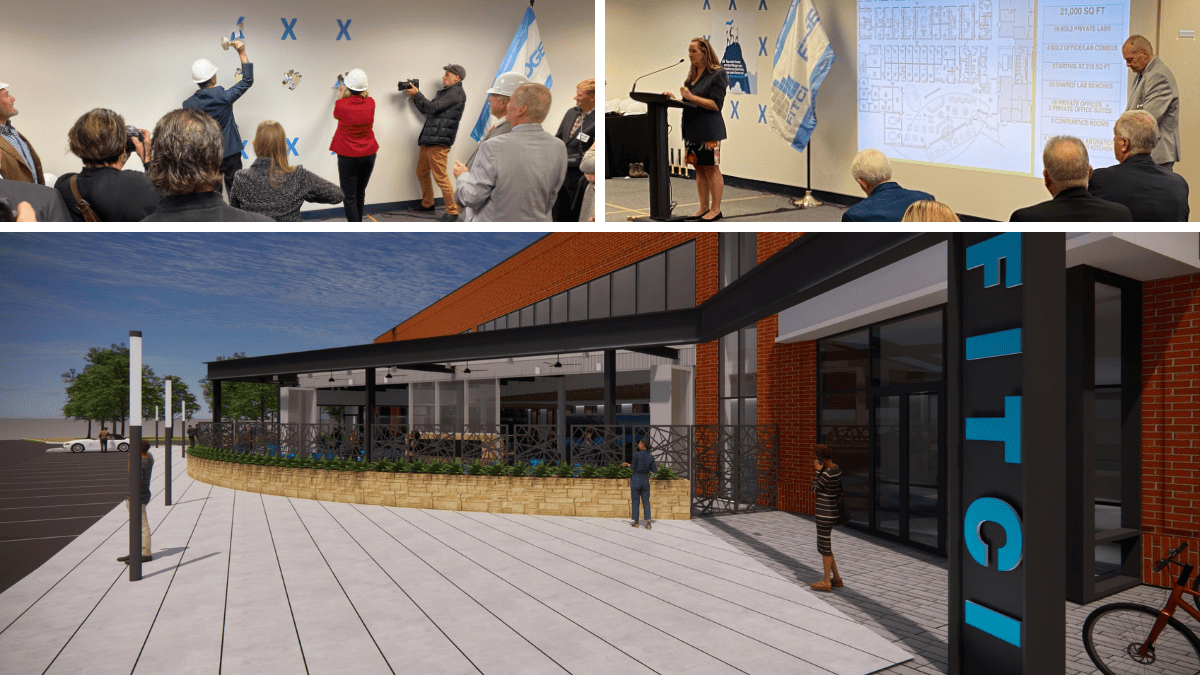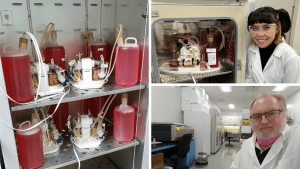
(SOURCE: BioBuzz Media and FITCI)
FITCI Begins Renovations of New EDGE@321 Facility
Sponsored by ECBuild / EwingCole
After three years of searching, looking at 23 different properties, and four letters of intent, Frederick Innovative Technology Center, Inc. (FITCI) has finally moved into its newest facility, the EDGE@321.
On November 3, public officials and FITCI partners gathered at the nonprofit’s portion of the building at 321 Ballenger Creek to celebrate the new beginning. The ceremony concluded with elected officials and partners kicking off the renovations themselves by taking down a wall with golden sledgehammers.
“This will take us to the next level… and it’s going to really establish the gold standard for how we help grow and support small businesses across the board with a focus on the tech sector,” said Senator Chris Van Hollen. “And as I understand the projections, it will fund 320 jobs and generate up to $125 million in private investment.”
The EDGE (Enabling Development & Growth for Entrepreneurs) is a 21,000-square-foot tech and biotech facility complete with a loading dock, freight elevator, common labs, and community center. When completed, the space will have 16 BSL-2 labs, 4 office/lab combos, 20 shared lab benches, 18 private offices, and 2 private office suites.
RELATED: With New EDGE Expansion, FITCI Looks Toward a Bright Future
When renovations are complete, the building will also have an outdoor space for events and recreation during the workday in addition to a large community room.
FITCI traditionally starts newer, smaller companies in the shared lab where they can get to know other companies and receive mentorship from other experts in their field. When they begin to expand and hire more employees, they can move to one of the private labs.
When Kathie Brady Callahan joined FITCI in 2016, she implemented a multi-pronged approach, which included introducing the shared lab spaces, adding more lab benches, and expanding the definition of a “science” company to allow more companies to benefit from FITCI’s resources. But the most important prong of the approach, Brady said, was the Frederick community, which immediately embraced her and her vision.
“I don’t think that there is anywhere else in the world that I could pull this off,” Brady said. “Because I didn’t know anyone here in Frederick [when I started], and it led to one CEO telling another CEO, and telling another CEO, and now we have 52 CEOs of very successful companies who helped our companies graduate.”
Looking at the future of the EDGE, Brady wants to continue to surround FITCI’s companies with experts in even more facets. This includes experts who can help companies navigate the FDA approval process, which currently can take companies more than 12 years to complete.
“We have so many amazing companies who can help our companies. It takes them 12 years when they know what they’re doing,” Brady said. “What if we can shorten that time? And we can, because we can put these collaborative spaces together.”
FITCI’s story is one of collaboration, not only inside its facilities at Metropolitan Drive and ROOT but also with the local, state, and federal governments. Public officials spoke on the support that they had provided FITCI with over the years and their continued commitment to the nonprofit.
“When I started 30 years ago, many years ago, I was employee number one, so I understand what it’s like to be an entrepreneur and what it’s like to try and struggle and figure out your way,” said Representative David Trone, who is an entrepreneur himself. “But what you have at FITCI here, it’s going to give these folks some direction, some guidance, and that’s going to create hope. That’s going to create success. That’s going to create a lot of jobs.”
Delegate Ken Kerr even has his district office at FITCI’s Metropolitan Court location and has frequently given visitors tours because he believes so wholeheartedly in FITCI’s mission. He also compares the collaboration needed in government to the collaboration that takes place at FITCI.
“That’s the same spirit that happens at FITCI, it’s all about relationships. That’s why everybody starts in a shared lab,” Kerr said. “You’ve got to work with others, but then you also have your peers that you can draw on for advice and they can make those connections.”
The event also unveiled FITCI’s first mascot: a mountain goat. The mascot is a representation of the tenacity and strength of entrepreneurs, a far cry from the chicks that another kind of incubator protect.
Kelly Schulz, president of the Maryland Tech Council, said that the event was a great reminder of the government support that entrepreneurs have in Maryland but that it also spoke to the community at large.
“To be able to see something like this that expands at such a rapid pace opening its doors to entrepreneurs that would not have another home, other mentors, and anyone else to be a part of their growth, it’s extremely important,” Schulz said.
To learn more about FITCI’s offerings, visit https://www.fitci.org/








